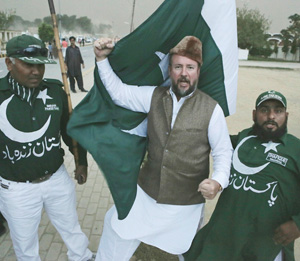
When Shane Smith, one of the founders of Vice Media, pitched a television show to MTV in 2010, it seemed unimaginable that the company that came out of Vice magazine could establish itself as a respected informational source about, well, anything (other than how to decorate your heroin stash). And yet the network bit, and The Vice Guide to Everything ran for eight episodes, balancing ridiculous segments against heavier fare.
With its latest television program, Vice, which premiered last week, the media company is once again trying its hand at American television. Not just television. HBO. And this time, it’s not trading on its nihilistic reputation. Instead, it’s asking audiences to trust in its international-relations acumen. It wants to be taken seriously. Or at least as seriously as it takes itself.
“This is the grown-up, smarter, more erudite version of Vice,” said Eddy Moretti, Vice Media’s executive creative director (and one of the producers of Vice). In addition to being more earnest than its predecessor, Moretti said, this show is intensely researched.
Like Vanguard but shorter and with more cursing, Vice features three correspondents whose job it is to “expose the absurdities of the modern condition”: Smith, Dos & Don’ts book editor Thomas Morton and a former intern named Ryan Duffy.
For the show’s first season, the trio treks deep into dangerous international terrain, with a special focus on the Middle East, India and the North Korea/Thailand/China region. (We hear that if HBO gives them a second season, they’ll cover domestic terrors as well.)
“News from the Edge” is the slogan that HBO has given Vice, which makes one wonder what counts as “news” these days. Vice goes to dangerous locales and puts its correspondents in inhospitable situations, but it is less current-affairs journalism than novelty of access.
Indeed, immersion and danger are the points of the show, facts that the hosts allude to throughout the segments. “The world is changing,” Smith intones in the credit sequence. “No one knows where it’s going. But we’ll be there.” It’s the ultimate humblebrag.
Bill Maher, the only non-Vice executive producer of the show—the other two are Smith and another Vice Media co-founder, Suroosh Alvi—is a natural fit to back the program, as his own off-color TV show is to politics what the Vice brand is to traditional reporting. Fareed Zakaria, who is a consultant on Vice, is a much stranger bedfellow. The fact that a CNN host would be involved in Shane Smith’s project suggests the media company is making a prime-time play for legitimacy with Vice.
Moretti stopped just short of calling Vice a “news” program—but that may be semantic. “I think it’s a documentary show,” said Moretti. “News, to me, is everything that happened in a day, from the weather to the president visiting Israel to, you know, a cat in a tree.”
It’s a potato/potahto situation: it’s not news in the timely sense, and yet meeting Taliban leaders is newsworthy. And in recent months, the media company has gotten used to finding itself in the news cycle.
With stunts like sending Dennis Rodman and the Harlem Globetrotters to North Korea (where “The Worm” became the first American to meet Kim Jong-un) and the accidental leaking of John McAfee’s whereabouts in Guatemala through a photographer’s metadata, Vice Media has become a newsmaker—if not a newsbreaker.
Still, Vice is having some trouble finding where it fits on the spectrum. It seems as though the show wants to stay true to its roots, in some ways, but also wants to be taken seriously; a hard line to toe, especially when your program is composed of two rushed 15-minute segments about “showing some of the scariest, weirdest and most absurd customs and practices known to humanity,” as Smith has referred to it.
That tongue-in-cheek tone is difficult to maintain when dealing with Vice‘s surprisingly serious subject matter: child bombers of the Taliban; India and Pakistan’s fights with Kashmir; political unrest in the Philippines. Half of each episode is the correspondents telling the audience how “fucked” the people in a particular region are, with interstitial shots of shockingly explicit footage from bombings, shootings and massacres. It’s not exactly “fun TV.”
In fact, several sources questioned whether HBO has gotten what it bargained for with Vice. They suggested that HBO was hesitant to work with the company—president of HBO Entertainment Sue Naegle in particular—but agreed on the condition that the program would deliver a scoop about Mitt Romney’s polygamist family in Mexico during the election cycle. (That particular piece ended up online, but the show proceeded anyway.) Moretti denied the existence of such a condition.



